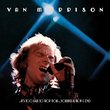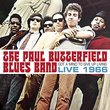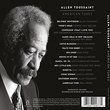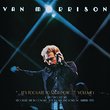| All Artists: Eggs Over Easy Title: Good 'N' Cheap: The Eggs Over Easy Story Members Wishing: 1 Total Copies: 0 Label: Yep Roc Records Release Date: 6/24/2016 Genres: Pop, Rock Style: Number of Discs: 2 SwapaCD Credits: 2 UPC: 634457240223 |
Search - Eggs Over Easy :: Good 'N' Cheap: The Eggs Over Easy Story
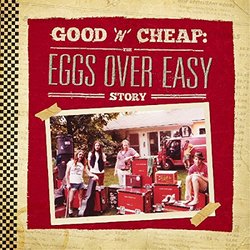 | Eggs Over Easy Good 'N' Cheap: The Eggs Over Easy Story Genres: Pop, Rock
Eggs Over Easy, the American band that invented pub rock, influenced the careers of Nick Lowe, Huey Lewis, Loudon Wainwright III and Elvis Costello, and laid the groundwork for a grass-roots movement that would spawn UK pu... more » |
Larger Image |
CD Details
Synopsis
Product Description
Eggs Over Easy, the American band that invented pub rock, influenced the careers of Nick Lowe, Huey Lewis, Loudon Wainwright III and Elvis Costello, and laid the groundwork for a grass-roots movement that would spawn UK punk, is finally getting its due with a deluxe 3xLP/2xCD set.
With roots stretching back to late 1960s Berkeley, CA, the three principals in the Eggs songwriters Jack O'Hara, Austin de Lone, and Brien Hopkins would by early 1971 find themselves ensconced in London s Olympic Studios, lured by Animals bassist and Jimi Hendrix manager Chas Chandler, and an apparitional record deal.
When said deal went bust the Eggs "did what any American band would do," Stiff Records co-founder Dave Robinson told a journalist. "They went to the nearest bar and said, 'Give us your worst night.'" Which is how Eggs Over Easy leapt onto the pages of pop music history.
Their humble Monday night gigs at a former jazz club called the Tally Ho - pub rock ground zero - would become the hub for a network of artists, venues, and music business machers that included back-to-basics groups Ducks Deluxe, Bees Make Honey and Dr. Feelgood, DJs John Peel and Charlie Gillett, and hustlers like Jake Riviera and Mr. Robinson.
For the first time ever, the entire Eggs Over Easy catalog, lovingly remastered and restored, is available as a deluxe set. Included in this collection is their debut album Good 'n' Cheap, produced by Link Wray and originally released on A&M Records in 1972, their rarely-heard second LP, Fear of Frying, originally (if barely) released on Lee Michaels' Squish Records in 1980, two songs from the band's lone single released on Buffalo Records, and the previously unreleased London '71 sessions produced by Chandler. Inside the The 2xCD package includes a 24-page booklet, and the 3xLP set features an 8-page insert, with extremely rare photos, show flyers, early press clippings, musician and writer credits, plus the definitive story of the band by acclaimed music writer Gene Sculatti, who called Good 'n' Cheap a "near-masterpiece" when he reviewed it for Creem Magazine in 1972.
With roots stretching back to late 1960s Berkeley, CA, the three principals in the Eggs songwriters Jack O'Hara, Austin de Lone, and Brien Hopkins would by early 1971 find themselves ensconced in London s Olympic Studios, lured by Animals bassist and Jimi Hendrix manager Chas Chandler, and an apparitional record deal.
When said deal went bust the Eggs "did what any American band would do," Stiff Records co-founder Dave Robinson told a journalist. "They went to the nearest bar and said, 'Give us your worst night.'" Which is how Eggs Over Easy leapt onto the pages of pop music history.
Their humble Monday night gigs at a former jazz club called the Tally Ho - pub rock ground zero - would become the hub for a network of artists, venues, and music business machers that included back-to-basics groups Ducks Deluxe, Bees Make Honey and Dr. Feelgood, DJs John Peel and Charlie Gillett, and hustlers like Jake Riviera and Mr. Robinson.
For the first time ever, the entire Eggs Over Easy catalog, lovingly remastered and restored, is available as a deluxe set. Included in this collection is their debut album Good 'n' Cheap, produced by Link Wray and originally released on A&M Records in 1972, their rarely-heard second LP, Fear of Frying, originally (if barely) released on Lee Michaels' Squish Records in 1980, two songs from the band's lone single released on Buffalo Records, and the previously unreleased London '71 sessions produced by Chandler. Inside the The 2xCD package includes a 24-page booklet, and the 3xLP set features an 8-page insert, with extremely rare photos, show flyers, early press clippings, musician and writer credits, plus the definitive story of the band by acclaimed music writer Gene Sculatti, who called Good 'n' Cheap a "near-masterpiece" when he reviewed it for Creem Magazine in 1972.
Similar CDs
| Colvin & Earle Colvin & Earle [Deluxe Edition] Genres: Pop, Rock Label: Fantasy | |
| Allen Toussaint American Tunes Genres: Jazz, Pop Label: Nonesuch | |

 Track Listings (24) - Disc #1
Track Listings (24) - Disc #1![Colvin & Earle [Deluxe Edition]](https://nationalbookswap.com/cd//m/43/1343/13341343.jpg)
